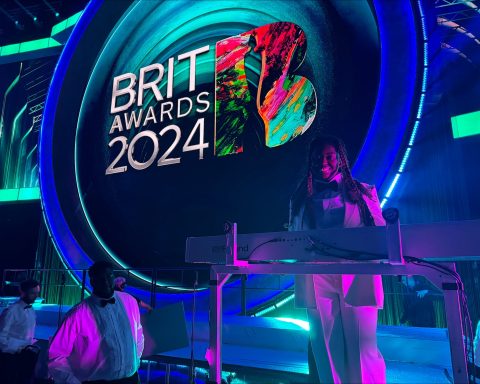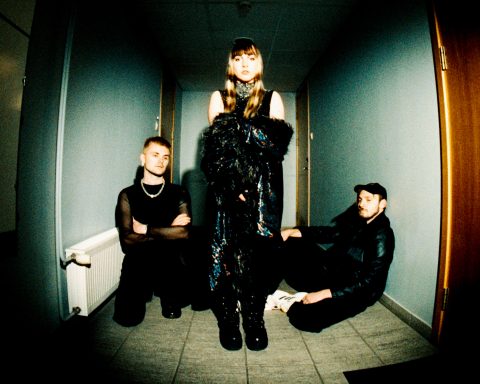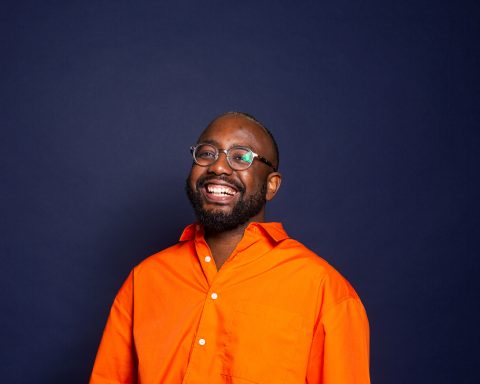Synth-pop band Nation of Language filters its sound through the nostalgia-fueled lens of the 1980s. Inspired by a beloved OMD single, songwriter/vocalist Ian Richard Devaney departed indie-rock band The Static Jacks. Nation of Language debuted in 2020 with its unpretentious electronic pop LP Introduction, Presence. Also comprising vocalist Aidan Noell and Alex MacKay on bass, Strange Disciple sees the group further evolve its hypnotic, melancholy electro-pop sound under the guidance of LCD Soundsystem synth maestro Nick Milhiser. Devaney reveals the logic behind his continued use of analog gear and resistance to overthinking his songcraft.
Past Influences
Electronic pop is a very British domain. Were you more impressed by bands from that region than your native US?
If I start to assemble a list in my head of bands that inspired me, Kraftwerk and Yellow Magic Orchestra are certainly in there. But then New Order, OMD, and the Human League are all very British influences. Then there’s the Canadian band Rational Youth from the mid-late ’80s. Their album Cold War Night Life was very important during the early days of this band.
OMD’s “Electricity” appears to have been a somewhat defining single for you.
“Electricity” was a song I heard my parents play a lot when I was a little kid, although I hadn’t heard it for a long time. At some point, it came on the car radio, and I felt that there was still this sloppiness and energy that spoke to the punk music I was listening to at the time, combined with textures that sounded so different. From that moment, I thought, “Maybe I should set the guitars to the background and just write with a bass guitar, mono synth, and maybe an organ.” That became the path to the music I make now.
Were you a student of the instruments that a band like OMD might have used?
I’d always look at live shots of synth-pop bands to see what they were using. For example, one of my first string synths was a Roland RS-101, purely because I saw it in a lot of artists’ live setups. The Moog was always my dream synth because it appeared in Kraftwerk videos. But my idea was to let my modern influences filter through the instruments of that era and discover what that would sound like. The first synth I had was a Moog, and then a big electric piano with a million sounds on it that I used alongside my friend’s Roland Alpha Juno-1.
“One of my first string synths was a Roland RS-101, purely because I saw it in a lot of artists’ live setups.”
Going up a Gear
You’ve been active since 2016. But the pandemic seemed to rev up your output, enabling you to record two albums in a relatively short time.
The first album was recorded over a fairly long period because we were working in cafés and restaurants. Aidan was a nanny, which meant we could only go into the studio when we didn’t have a shift. We released Introduction, Presence just as lockdown started, which was unfortunate. So we went back in and started working on the second album. We actually had a couple of songs written before the first album was finished that ended up on A Way Forward.

Lyrical Narratives
There’s a lot of bad stuff happening in the world, but that’s rare in synth-pop. Do you see the genre’s sole function as being escapist?
I try not to think of Nation of Language as having a sole function, and it can be difficult to write songs based on world events in a natural way if they’re not based on my direct experiences. Most of the music I feel drawn to is melancholy in some way, whether that’s The National or Leonard Cohen. One of my favorite things is when songs seem upbeat or cheery, yet on further examination, what they’re saying is a downer. The band Little Joy did that incredibly well, and they were important to my navigating that.
Your latest LP, Strange Disciple, has a cryptic title. What are some of the lyrical narratives driving the songs?
The title refers to what each of us becomes when we’re infatuated with someone. We find ourselves behaving in a way that we don’t recognize due to the agony and ecstasy that come with obsession. I wasn’t just recalling moments of unrequited love or relational imbalances in my life but putting myself in other people’s shoes and trying to create a narrative that highlights the emotion rather than the experience.
“I’ve learned a lot from those old synth-pop bands that had to use the only synth available.”
Economy of Choice
Strange Disciple seems deliberately economical in its choice of sounds. Does experience teach you that?
I’ve learned a lot from those old synth-pop bands that had to use the only synth available. But it can be difficult to achieve that when you’re in a studio with lots of synthesizers and want to reach for all of them. I enjoy reveling in the restraints of limiting myself to a few instruments. Although that approach might limit the sonic landscape, each synth is capable of so many things, and it’s fun trying to push them as far as they can go. Ultimately, we’re always trying to figure out what aspect of a song makes it shine and how to highlight that or clear things away to allow it to do so.
LCD Soundsystem synth maestro Nick Millhiser produced the album. What element of the production required his guidance?
Nick worked on several songs on A Way Forward, so we thought it would be cool to share the reigns with him for the entirety of this album. His working style is very analog, and he’s not super precious about things. We’d typically do three or four vocal passes per song and only take a couple of synths out before moving on fairly quickly. Nick would also encourage us not to overthink things or tweak every note or warble that poked out.
“To be able to record things on a laptop is a product of the modern era that I‘m very grateful for.”
Vintage Tape Delay
Do you deliberately aim for a retro-sounding tonal palette?
I like to think of some of the sounds as being ’70s-based in the sense that early Kraftwerk is such a heavy influence on the sounds I want a synthesizer to make. There were also three or four Roland RE-201 Space Echos in Nick’s studio. So almost everything touched a tape delay at some point in the recording process, which lent a vintage vibe to things. One has a slightly decaying tape, so you get these weird aberrations that make everything sound slightly older. That way of working and its unpredictability has grown with each record.
"Loving the synth-pop and post-punk bands of the '70s and '80s was something I could bond over with my parents. It's fascinating to witness other people having a similar experience."
Peers and Parents
Do you tend to have a young audience, or have you found that you’re attracting those with a particular nostalgia for synth-pop?
We meet a lot of peers and their parents at after-shows, which is really cool. Loving the synth-pop and post-punk bands of the ’70s and ’80s was something I could bond over with my parents. So it’s fascinating to witness other people having a similar experience with my music. I’ve always liked the idea of being a conduit to one’s influences because I always appreciated it when bands I loved did that.
Do you sometimes wonder if Nation of Language was born in the wrong era? You might have been millionaires had you arrived in 1982.
I’m pretty content. Even the Napster era seems so far away that I can’t imagine what it would look like now. And in terms of getting started, to be able to record things on a laptop is a product of the modern era that I‘m very grateful for. The millions of dollars part would be great, though.







